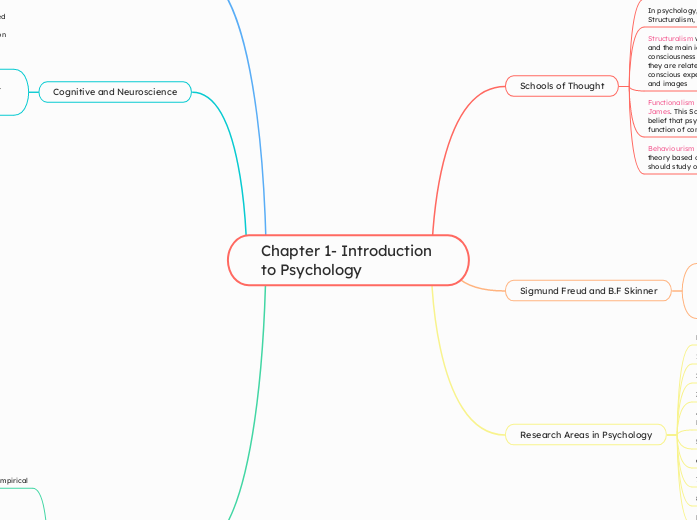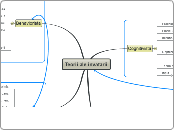Chapter 1- Introduction to Psychology
7 Themes in Psychology
Empiricism is the premise that knowledge should be acquired through observation. This means that its conclusions are based on observation rather than reasoning, beliefs, or speculation. This approach usually requires a certain amount of skepticism.
Theme 1: Psychology is Empirical
Psychologists do not just collect facts, but seek to explain and understand what they have observed. No theory can properly explain everything known about behaviour, so psychologists recognize that theoretical diversity is a strength
Theme 2: Psychology is Theoretically Diverse
Many connections exist between what happens in psychology and what happens in society. Trends and societal issues influence psychology's evolution. Culture belonging to entire societies or broad groups within societies but this concept can also be applied to small groups.
Theme 3: Psychology Evolves in a Sociohistorical Context
Psychologists found that behaviour is controlled by a complex network of interacting factors, an idea referred to as the multifactorial causation of behaviour. Most aspects of behavior are determined by multiple causes
Theme 4: Behaviour is Determined by Multiple Causes:
Cultural factors are very prominent to determining human behaviour. People's cultural backgrounds help influence their behaviour. The definition of culture is the widely shared beliefs, norms, institutions, customs of a community that is spread across generations.
Theme 5: Behaviour is Shaped by Cultural Heritage
This theme discusses the concept of nature versus nurture. If an individual is who they are based on their environment or genetics. In the past, it always had to be one or the other but now psychologists agree that a combination of heredity and environment are both important.
Theme 6: Heredity and Environment Jointly Influence Behaviour
People usually are subjective to viewing their world the way they want to. Human subjectivity is very normal as people do not want to distort the way they see life. People actively choose to ignore different types of stimulation and focus on others because it all depends on what they want to expose themselves to.
Theme 7: People's Experience of the World is Highly Subjective
Cognitive and Neuroscience
Advocates of the behavioural neuroscience perspective maintain that much of our behaviour can be explained in terms of structures and processes in the brain.
Cognition refers to the mental processes involved in acquiring knowledge. Due to the domanice of behaviorism, it discouraged the study of cognition or the unobservable. The cognitive perspective points out that people's manipulation of mental images influence their behaviour
The Birth of Psychology
Wundt's creation of what psychology was so popular that it lasted for two whole decades. According to Wundt, the surrounding concept of psychology should be consciousness. So psychology became the study of conscious mind
William Wundt, a German professor was the father of psychology.
Research Areas in Psychology
Health Psychology
8) Educational Psychology
7) Psychometric Psychology
6) Personality Psychology
5) Cognitive Psychology
4) Behavioural neuroscience/Biological Psychology
3) Experimental Psychology
2) Social Psychology
1) Developmental Psychology
Nine research areas in psychology are:
Sigmund Freud and B.F Skinner
Skinner emphasized how environmental factors contribute to one's behaviour. He believed that organisms tend to repeat responses that lead to positive outcomes and tend to not respond to negative outcomes.
He asserted that all behaviour is fully governed by external stimuli. According to Skinner, we are all controlled by our environment, so in essence free will is an illusion.
Freud was quite a revolutionist when it came to psychology because he unpacked something nobody else ever thought of: the unconscious mind
He created something called the unconscious which contained thoughts, memories, and desires that were below the surface of conscious awareness. Concluded that psychological disturbances are caused by personal conflicts at an unconscious level. He was also controversial because he proposed that behaviour is influenced by coping with sexual urges.
Schools of Thought
Behaviourism founded by John B. Watson is a theory based on the idea that scientific psychology should study only observable behaviour.
Functionalism was heavily influenced by William James. This School of Thought was based on the belief that psychology should investigate the function of consciousness rather than structure.
Structuralism was created by Edward Titchener, and the main idea surrounding it was to analyze consciousness into basic elements and see how they are related. They wanted to understand more conscious experiences such as sensations, feelings and images
In psychology, the main schools of thought were Structuralism, Functionalism, and Behaviourism.
Subtopic









